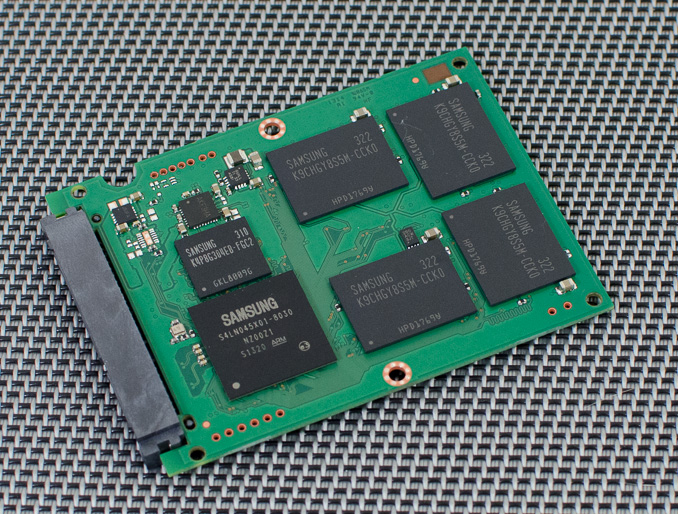Samsung SSD 840 EVO Review: 120GB, 250GB, 500GB, 750GB & 1TB Models Tested
by Anand Lal Shimpi on July 25, 2013 1:53 PM EST- Posted in
- Storage
- SSDs
- Samsung
- TLC
- Samsung SSD 840
Final Words
I was extremely excited about Crucial's M500 because it was the first reasonably priced ~1TB SSD. Even though its performance wasn't class leading, it was honestly good enough to make the recommendation a no-brainer. The inclusion of features like eDrive support were just the icing on the cake. With the EVO, Samsung puts forth a formidable competitor to the M500. It's faster, uses less power at idle and carries lower MSRPs for most of the capacity range. Microsoft's eDrive standard isn't supported at launch, but Samsung expects to change that via a firmware update this September.
Endurance isn't a concern with TLC for client workloads, although I wouldn't recommend deploying the EVO in a write heavy database server or anything like that.
The additional features that Samsung threw in the pot this round really show some innovative thinking. TurboWrite does a good job of blurring the lines between MLC and TLC performance, while Samsung's RAPID DRAM cache offers adventurous users a way of getting a taste of high-end PCIe SSD performance out of an affordable TLC SATA drive.
The 1TB version is exciting because it offers a competitive price with the 960GB M500 but with better performance. It's also good to have an alternative there as the 960GB M500 has been supply constrained at times. At first I didn't believe that Samsung's TLC strategy could hold weight against the Intel/Micron approach of aggressively pursuing smaller process nodes with MLC NAND, but the EVO does a lot to change my opinion. I'd have no issues with one of these drives in my system even as primary storage. The performance story is really good (particularly with the larger capacities), performance consistency out of the box is ok (and gets better if you can leave more free space on the drive) and you've got Samsung's firmware expertise supporting you along the way as well.

To say that I really like the EVO is an understatement. If Samsung can keep quantities of the 840 EVO flowing, and keep prices at or below its MSRP, it'll be a real winner and probably my pick for best mainstream SSD.











137 Comments
View All Comments
Timur Born - Sunday, July 28, 2013 - link
Just did a quick test: On my 8 gb RAM system Windows 8 uses quite exactly 1 gb for write caching and all available RAM for read caching. It doesn't matter whether the 1 gb consist of one or several files and whether they fit into the cache as a whole or not (first 1 gb is cached if not).1Angelreloaded - Friday, July 26, 2013 - link
Hold on a second correct me if I'm wrong on this paradox. Did Samsung not scale back on NAND production in order to drive the price up for greater bloated profits, now as stated in Korea press conference they want "SSDs for everyone". WTF is going on here, and why are SSDs not at more reasonable pricing by now about .33cents per gig.?They had a complete shot at burying HDDs after the flood and the price hike.FunBunny2 - Friday, July 26, 2013 - link
Don't confuse capitalists with intelligence. They look at unit margin and ignore gross profit. IOW, they'd rather sell 100 at $2 margin than 1,000 at $1 margin. They're stupid.MrSpadge - Saturday, July 27, 2013 - link
There's also the factor of marget saturation to take into account. You can't sell an infinite number of drives.Notmyusualid - Friday, July 26, 2013 - link
Exciting technology indeed! Impressive numbers, nice identification of spare computer resources, and put to good use too. I'd imagine this would be the go-to drive for most users...But I'd like my clocks available for my applications thanks.
In addition, I'm not willing to put my data on any non-enterprise disk now, cost be damned. Burned too many times now.
Interesting product though....
z28dreams - Friday, July 26, 2013 - link
I recently saw the Plextor M5P (pro) for $190 on sale.If the 840 evo comes out in the same price range, which would be a better buy?
It looks like the write seems of the M5P are better, but I'm not about overall performance.
K_Space - Friday, July 26, 2013 - link
Help a noob here: How is Rapid any different to a custom nonvolatile RAM disk with your selected cached files stored on it & these being written to the SSD at an interval? Is it mainly because Rapid can writes in blocks and it's more intelligent in its choice of cached files?wpapolis - Saturday, July 27, 2013 - link
Hey there all,I have a MacBook 13" from late 2008, the first gen of the unibody construction (Model MB467*/A).
My bus speed is SATA 3Gbit/s.
What's the best SSD for me?
Trim doesn't work automatically for me, though I have found the commands to use in terminal to enable it.
This Samsung drives looks really good, but it seems like I won't be able to use RAPID, or perhaps even TRIM. Plus I am limited by my bus speed. Should I still go for this Samsung just because the price might be the same as lower featured alternatives?
What do you guys suggest? I want one in the 250GB range.
Thanks,
Bill
TheinsanegamerN - Saturday, July 27, 2013 - link
if you have a mac, the samsung is your best bet. TRIM can be enabled quite easily on a mac if it is not done automatically, so you can use trim. as for RAPID, it replaces window's terrible i/o caching process. osx does not have this problem, so you dont have to worry about that. now, the sata2 interface will be a bottleneck, but it will still be much faster than a hard drive. id go for either this evo drive or the 840 250gbwpapolis - Saturday, July 27, 2013 - link
Yes, you reaffirmed what I was already thinking.Plus, when I upgrade this MacBook, I have the option to move the drive. Though, I have to say, performance is still pretty good, but each OS upgrade seems to make things a bit more sluggish.
With 8GB RAM, and a current SSD, things should be good for a bit longer.
Thanks for the feedback,
Bill